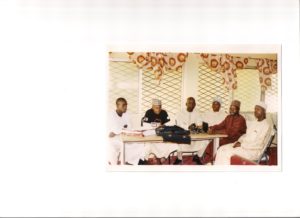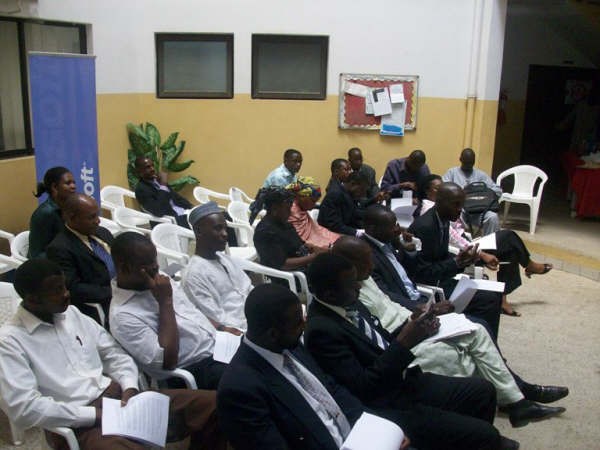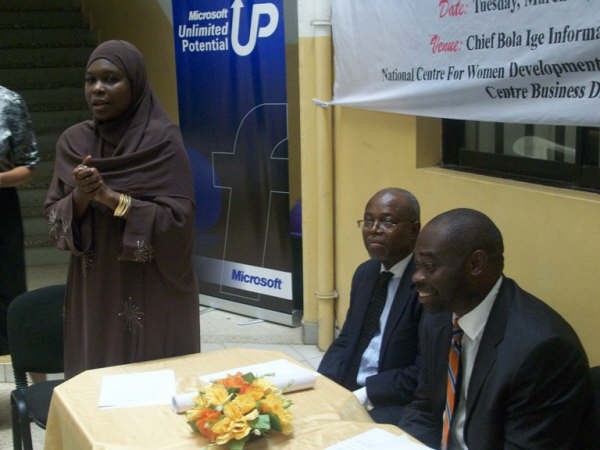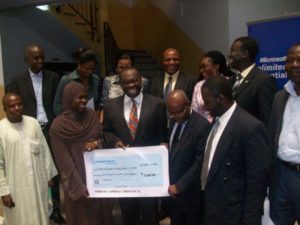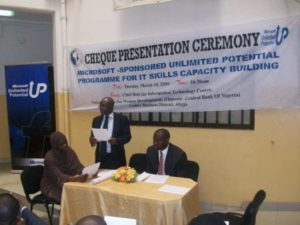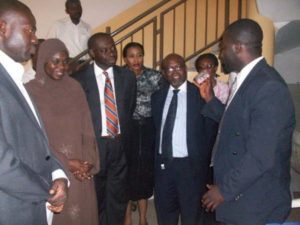<!– /* Style Definitions */ p.MsoNormal, li.MsoNormal, div.MsoNormal {mso-style-parent:””; margin:0in; margin-bottom:.0001pt; mso-pagination:widow-orphan; font-size:12.0pt; font-family:”Times New Roman”; mso-fareast-font-family:”Times New Roman”;} @page Section1 {size:8.5in 11.0in; margin:1.0in 1.25in 1.0in 1.25in; mso-header-margin:.5in; mso-footer-margin:.5in; mso-paper-source:0;} div.Section1 {page:Section1;} –>
By
Y. Z. Ya’u
08056180208
It was a one-table exhibition, arranged at the foyer of the Bola Ige Information Technology Centre, National Women Centre, Abuja. The date was Tuesday, 10th March, 2009. On display were baby cots, baby bag, basket, various types of perfumes, soaps, chocolates, curie, pomade and many other household needs. These items were products of women who were trained on Information Technology skills at the Prof. Iya Abubakar Community Centre, Bauchi under the Microsoft Corporation social corporate responsibility flagship programme, the Unlimited Potential. Under the programme at the Bauchi centre, 50 women living on purdah (seclusion) were trained on basic IT skills and entrepreneurship. Noting that Bauchi is a centre of tourism, the programme planners had thought to add value to this by targeting women who already had some handcraft skills.
The result was an astonishing torrent of creativity that has produced these products which are of very high international standards, yet all made from locally available materials. If you run into customs officials at either the airport or the border with these items, you will have hard time explaining to them that these are local products, and not imported ones. Does this not tell us that industry lies in the empowerment of the people?
The secret as revealed by Yusuf Mahmoud, a staff of the Iya Abubaka Community Centre who conducted people round the exhibition was that the women were able to leverage their newly acquired IT skills, browsing through relevant websites, downloading designs and recipes which they then adopted and used local materials to produce their items. Their furniture making mini-factory in Bauchi is an elite must.
Internet has allowed them to research and experiment with various formulas, they were able for instance to discover that the reason for theharshness of most locally produced toilet was the wrong mixed of chemicals and used this knowledge to produce a soap that is soft to the skin and adopted to the local weather conditions.
Today many of these women who are secluded and therefore living from homes, have found an outlet for their creativity through the internet. They are economically empowered and fully engaged. They have also found an outlet for these products through online marketing.
For the country, Jummai Umar-Ajibola, the Citizenship Manager of Microsoft, said the contribution of the women is that by uploading their recipes to the internet so that other people can download and use, they are re-branding the image of the country from one that is associated with the cyber crime to a potentially enrich networking engagement of global benefit. There is of course also the fact that by helping them to be on their own, the value added by the IT training on them has created jobs which are generating incomes directly for the beneficiaries and indirectly adding to the wealth of the country.
The event at which the exhibition was presented was the kick off of the third phase of the Unlimited Potential Programme of Microsoft which also provided an opportunity to review the achievement of the first and second phase of the programme. No doubt form the exhibition and tales from others, there is something to celebrate of the programme.
The Unlimited Potential Programme was started two years ago with a grant of $90,000 to the Bola Ige Information Technology Centre and five of its partners to extend access to ICT skills to disadvantaged and marginalized people, who will otherwise not have access to such training. It is targeted at delivering relevant, accessible and affordable solutions in three interrelated areas that are crucial to developing economic opportunity, namely transforming education, fostering local innovation and enabling jobs and opportunities.
Since the inception of the programme, over 4000 people, men and women have been reached across all the six zones of the country. In summing up the achievement, Dr. Many Emechata, the Director of the BIITC and Coordinator of the Project said it had been a resounding success. It has opened up new windows of opportunity for the beneficiaries and enables them to increase their market scope with exposure to a wider community of people engaged or interested in their skills.
The programme was domiciled in six centers across the country, each with its specific focus. The north east zone which was handled by the Iya Abubakar Community centre focused on secluded women in the first year and widows in the second year. In the South West, located at the Community Computer Centre, Abeokuta the targets were on women focusing on tie and dye business. The Calaber Zone tackled fishermen and women while Kaduna Zone trained women traders and farmers.
The BIITC which handled the North Central in addition to being the coordinator of the project had a more challenging engagement. It trained disabled people in the first year focusing on those with impaired vision, hard hearing and the physically challenged. For the second year, it targeted HIV positive people. The experience in both cases was rewarding as it not only provided these people with new skills and knowledge but also facilitated their integration into the mainstream society which tend to stigmatize such people.
This year the programme added three addition organizations to reach out to wider geographical spread of the country as well as target other groups of people. Paradigm Initiative Nigeria (PIN) in Lagos will now take over the implementation in the South West and will be focusing on training youths. In South East, Women Aid Collective (WACOL) will step in with special emphasis on widows while in the North West, the Centre for Information Technology and Development (CITAD) will take over and focus on youths and journalists as well as creating an interface between the trained people and their governments.
So far, Microsoft has put over $220,000 into the project. Of course for the world software giant, this could be a small amount, but then if all other companies operating in the IT sector could do the same, we would certainly be getting nearer to the goal of universal IT literacy for all, which the United Nations hopes would be achieved globally by 2015. But there is even more to getting social corporate responsibility. Governments in the country would have to realize that the dream for a better economy cannot come through without investment in education which today is IT-driven.
